Dreaming of an African safari but worried about the cost? You’re not alone. Many travelers think an African adventure is out of reach, but with a bit of savvy planning, you can experience the magic of the savannah without very costly.
From choosing the right destination to booking at the perfect time, there are plenty of strategies to make your safari both affordable and unforgettable. Jump into our tips and tricks to turn your dream safari into a reality, all while staying within your budget.
Key Takeaways
- Choose the Right Destination: Opt for budget-friendly safari destinations such as South Africa, Namibia, and Zimbabwe, which offer excellent value for money, good infrastructure, and diverse wildlife.
- Plan Your Budget Wisely: Set a realistic budget by understanding typical safari costs and choosing self-drive options, local accommodations, and off-season travel to save money.
- Book Smartly: Leverage local tour operators, book in advance to secure discounts, and consider group tours to reduce overall costs.
- Select Affordable Accommodations: Consider camping, glamping, and local lodges with self-catering facilities to minimize lodging expenses while still enjoying a unique safari experience.
- Travel During Optimal Times: Visit during the off-season for significant savings and fewer crowds but still enjoy vibrant landscapes and excellent wildlife sightings.
- Utilize Resources and Insurance: Use local safari operators, online booking platforms, and secure travel insurance to ensure a well-prepared, cost-effective safari adventure.
Choose the Right Safari Destination
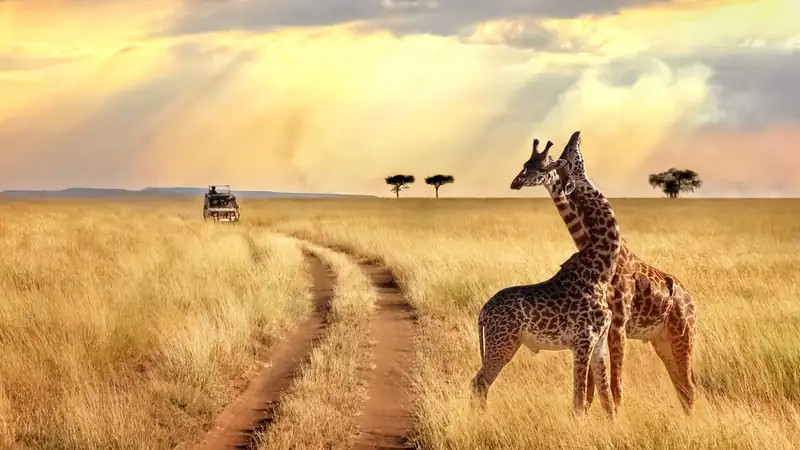
When planning an affordable African safari, choosing the right destination can make all the difference. Some countries offer unique experiences without very costly.
Top Affordable Safari Destinations in Africa
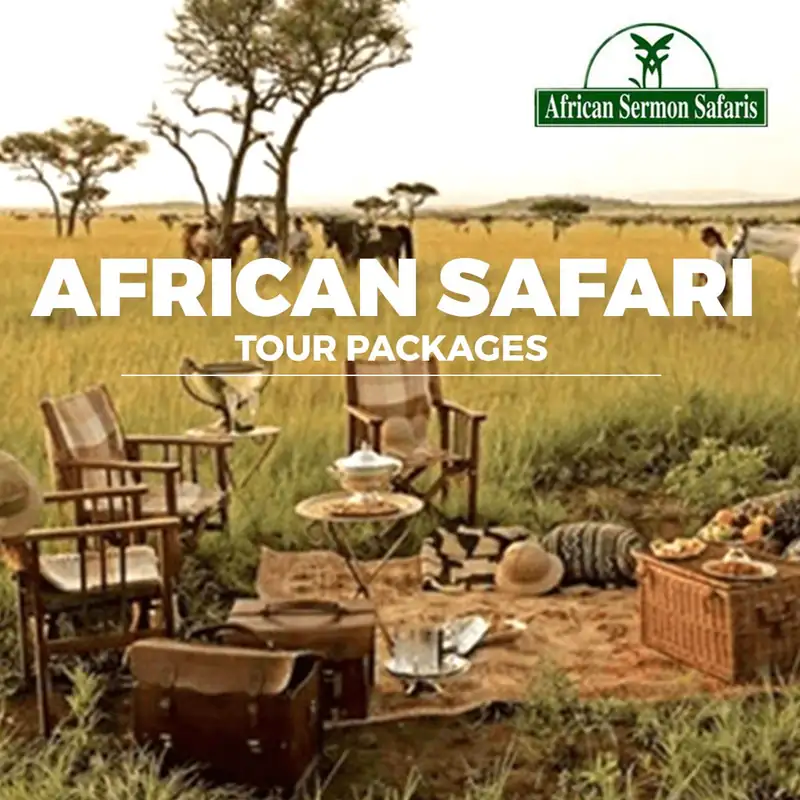
- South Africa: South Africa boasts favorable exchange rates and excellent infrastructure. Kruger National Park is perfect for spotting the Big 5, and the Garden Route Game Lodge offers stunning views and diverse wildlife. Opt for self-drive holidays or camping trips here to save even more.
- Namibia: Namibia is great value for money. Its low costs for accommodation, food, and transport make it a top choice. Explore the vast safari parks or take a scenic self-drive holiday on the country’s good road networks.
- Zimbabwe: Zimbabwe offers excellent value with low costs for lodging, meals, and transportation. Hwange National Park is a standout for seeing the Big 5. Choose self-drive options for a budget-friendly adventure.
- Cost and Affordability: Consider destinations with low accommodation and travel costs, like Zimbabwe and Namibia. Self-drive options and camping can also reduce expenses.
- Infrastructure and Accessibility: Opt for countries with good road networks and reliable public transport. South Africa and Namibia excel in this aspect, providing easy access to parks and lodges.
- Wildlife and Activities: Identify what wildlife you want to see and the activities you wish to pursue. Kruger National Park in South Africa and Hwange National Park in Zimbabwe are great for spotting the Big 5.
- Seasonal Variations: Pay attention to the best times to visit each location. For instance, visit South Africa’s Kruger National Park during the dry winter months (May to September) for optimal wildlife viewing.
- Safety and Political Stability: Research the current political climate and safety precautions of each country. Ensure your chosen destination is safe and tourist-friendly.
- Accommodations and Facilities: Look for budget-friendly lodges, campsites, and self-catering options. Below is a table comparing typical accommodation costs:
| Destination | Lodge Price (per night) | Campsite Price (per night) |
|---|---|---|
| South Africa | $60 – $120 | $20 – $40 |
| Namibia | $50 – $100 | $15 – $35 |
| Zimbabwe | $45 – $95 | $10 – $30 |
Choosing the right destination based on these factors can help you plan an affordable, unforgettable safari experience.
Plan Your Safari Budget
Planning an affordable African safari requires setting a realistic budget. This section will help you navigate the costs and strategies for making your safari dream a reality.
Tips on Setting a Realistic Budget
Understanding typical costs is essential. A standard 10-day safari in Botswana can range between $8,500 and $11,000 per person. This includes internal flights and other expenses. For a budget-friendly option, consider a 9-day trip to Kenya. Such a trip, including several safari drives, can cost about $2,000, excluding flights.
Choosing the right destination matters. South Africa, Namibia, and Zimbabwe offer more affordable options. These places have favorable exchange rates, good infrastructure for self-drive holidays, and lower costs for accommodation, food, and transport. By selecting these destinations, you can enjoy a rich safari experience without very costly.
Accommodation plays a big role in your budget. Compromising on luxury can significantly reduce costs. Opting for tented camps instead of luxury safari lodges offers a more authentic and affordable experience.
Cost-Saving Strategies for Safari Trips
Book during the off-season. Traveling during the low season means lower prices and fewer crowds. For instance, visiting Tanzania from March to May can lead to significant savings.
Join group tours. Sharing the costs of a guide, vehicle, and accommodation with a group can make your safari more economical. Look for group tours that match your interests and travel goals.
Use local operators. Local safari operators often offer better deals than international agencies. They can provide authentic experiences at a fraction of the cost.
Consider self-drive safaris. Particularly in destinations like South Africa and Namibia, self-driving can save on transportation costs. It also gives you the freedom to explore at your own pace.
Leverage loyalty points or travel rewards. Many airlines and hotels offer rewards programs that can reduce your travel expenses. Use your points strategically to cover flights or accommodations.
By implementing these strategies, you can enjoy a memorable safari while staying within your budget.
Pick the Perfect Time to Travel
Choosing the optimal time for your African safari can make a significant difference in both your experience and your budget. Various factors, from the seasons to local wildlife patterns, need to be considered to ensure you get the most out of your adventure.
Benefits of Traveling in the Off-Season
Traveling during the off-season, often referred to as the “green season” or “low season,” offers several key benefits:
- Lower Costs: Prices for safaris, accommodations, and tour packages are typically lower during the off-season, making the trip more affordable. You can often find discounts of up to 40% compared to peak-season rates.
- Fewer Tourists: You’ll encounter fewer tourists, providing a more intimate and peaceful safari experience. This reduction in crowding allows for better wildlife viewing opportunities and a more personalized experience.
- Lush Landscapes: The off-season, which usually coincides with the rainy season, means greener landscapes and flourishing flora. This vibrant environment can make your safari more picturesque and unique.
Weather Considerations and Wildlife Viewing
Understanding the weather and its impact on wildlife viewing is crucial for planning your safari:
- Dry Season: The dry season, typically from June to October in many regions, is considered the best time for wildlife viewing. Animals gather around water sources, making them easier to spot. But, this is also the peak tourist season, leading to higher costs and more crowds.
- Rainy Season: The rainy season, often from November to May, varies by location. While some roads might be less accessible, this period offers unique opportunities to see newborn animals and migratory birds. Also, the lush landscapes create stunning photographic opportunities.
- Transition Periods: Consider traveling during the shoulder seasons (just before or after the peak season). These periods provide a balance between affordable prices and favorable weather conditions. For example, late May or early November can be ideal for a budget-friendly safari with good wildlife sightings.
By carefully considering these factors, you can enhance your safari experience while keeping it affordable and memorable.
Book Your Safari Wisely
Embarking on an African safari doesn’t have to expensive. By making informed decisions, you can ensure a memorable experience without overspending. Here’s how to book your safari wisely.
Advantages of Booking Locally
Booking your safari through local operators offers numerous benefits that can enhance your experience while keeping costs manageable.
- Better Rates: Local companies often have stronger relationships with suppliers. A local operator like Happy World Safaris in Tanzania or Sunworld Safaris in Kenya can offer you better deals on accommodation and activities.
- Personalized Service: Local operators can tailor itineraries to suit your preferences. They have in-depth knowledge of the area, which allows for unique, off-the-beaten-path experiences that bigger operators might not offer.
- Support the Local Economy: Choosing a local company helps the local economy. It supports small businesses and provides jobs for local guides, drivers, and staff.
Benefits of Advance Planning and Booking
Planning ahead can significantly cut costs and ensure availability.
- Early Bird Discounts: Many safari lodges and camps offer early booking discounts. By securing your spot months in advance, you can take advantage of these reduced rates.
- Flexible Options: Booking early gives you more options in terms of accommodations and activities. You’ll have the pick of the best deals, both in terms of price and quality.
- Budget Management: Advance planning allows you to budget effectively. Knowing the costs upfront helps you to manage your finances better and avoid last-minute expenses that can escalate.
By leveraging these strategies, you can enjoy an affordable and unforgettable African safari.
Select Affordable Accommodation
Finding budget-friendly lodging is essential for planning an affordable African safari. Here are some of the best options to consider.
Budget-Friendly Lodging Options
- Camping and Glamping: Camping and glamping are highly affordable options. In places like Maun, Botswana, you can find glamping options for as low as $17 per night, which include hotel-like amenities under a tent. Many safari parks and reserves offer camping facilities, and some even provide the necessary gear, making it a cost-effective choice.
- Local Lodges and Tented Camps: Staying in locally owned lodges or tented camps can be more affordable than luxury safari lodges. For example, lodges in Kenya and Tanzania can cost under $50 per night. These establishments often provide a more authentic experience while supporting the local economy.
- Self-Catering: Self-catering allows you to control your food budget by preparing your own meals. In many safari destinations, you can find accommodations equipped with kitchen facilities. This option is particularly useful if you have dietary restrictions or prefer cooking your meals. But, it requires planning and sometimes dealing with limited local grocery options.
- Full Board: Full board accommodations include all meals, offering convenience and the opportunity to try local cuisine prepared by experienced chefs. This option can enhance your safari experience but might be pricier than self-catering. It’s ideal for those who want a hassle-free vacation without worrying about meal planning.
By carefully selecting the right type of accommodation and weighing the pros and cons of self-catering versus full board, you can significantly impact your safari budget while still enjoying an unforgettable experience.
Consider a Self-Drive Safari
A self-drive safari is a great way to experience the African wilderness on your own terms. With the flexibility and affordability it offers, it presents an accessible gateway to wildlife adventures. Here’s how to plan one:
Planning a Self-Drive Safari
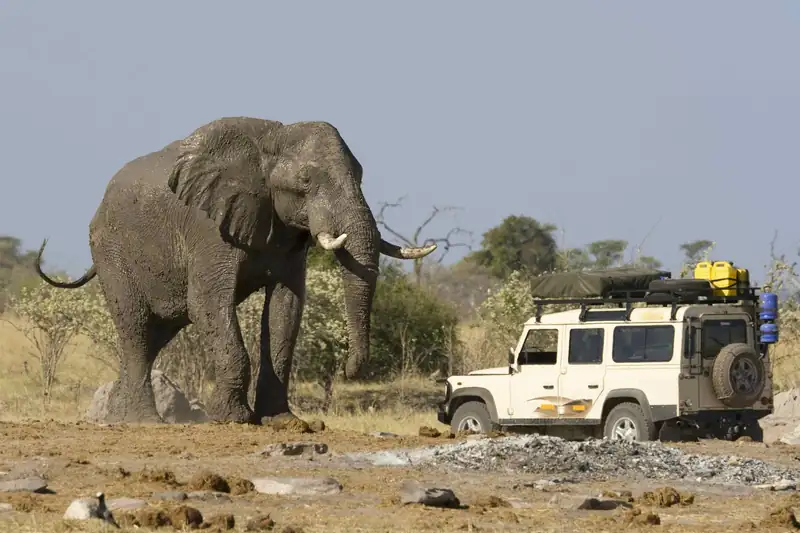
Choose the Right Destination
Picking the right country is crucial. South Africa and Namibia boast well-maintained roads and accessible game reserves, making them ideal. Zimbabwe is another fantastic option with low costs and good infrastructure. Each destination offers unique landscapes and game-viewing opportunities, so choose based on what you want to see.
Renting a Vehicle
Selecting the right vehicle is essential. A 4×4 is recommended to navigate uneven terrains in the reserves. In South Africa and Namibia, many companies offer a wide range of rental options to suit different budgets. Ensure your vehicle is equipped with necessary gear such as a spare tire, toolkit, and GPS.
Accommodation
Cut costs by opting for self-catering accommodations or camping. Many game reserves and nearby towns offer budget-friendly options. Camping within the reserve gives you the thrill of being close to nature, while self-catering lodges often provide basic kitchen facilities, letting you save on meals.
Safety Tips and Requirements
Essential Precautions
Stay safe by following a few essential precautions. Always keep your doors locked and windows up during game drives. Never get out of your vehicle except in designated areas. Carry a first aid kit and familiarize yourself with the local wildlife behaviors.
Legal Requirements
Make sure you’re aware of the legal requirements. An international driving permit is often required. Check with your rental agency about any additional permits or insurance needed for self-drive safaris. Having a good map and understanding the local road signs will help ensure a smooth journey.
Join Group Safaris
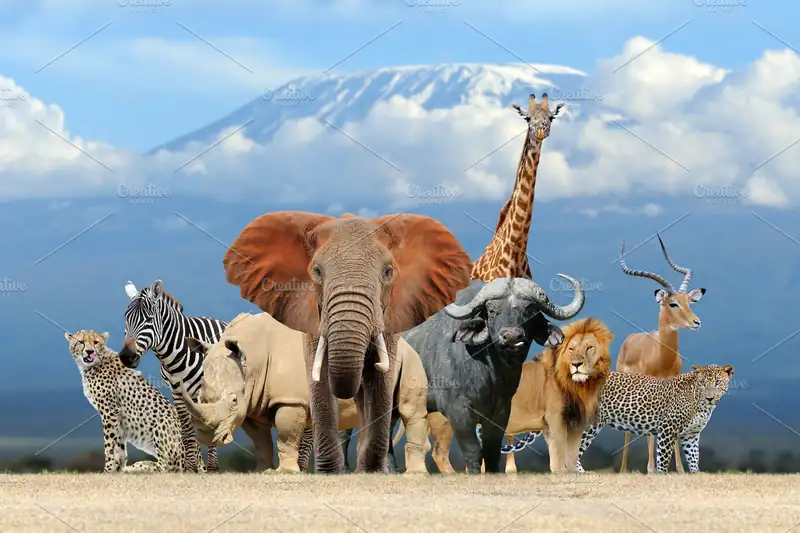
Benefits and Drawbacks of Group Safaris
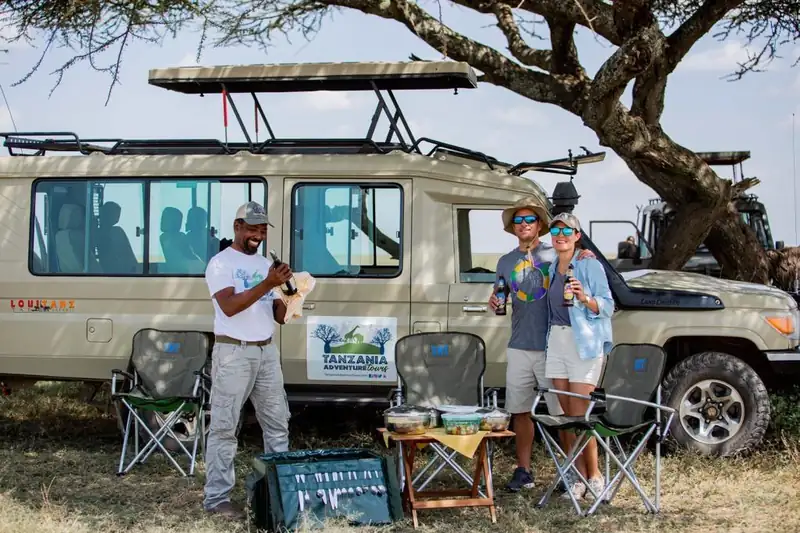
Joining a group safari is a fantastic way to cut costs and make new friends. Here are the benefits and a few potential drawbacks:
- Cost Savings: Group safaris split costs like transportation, guides, and accommodations among participants, making it cheaper per person. For instance, filling an 8-passenger Land Cruiser reduces individual expenses.
- Social Experience: Traveling with others can enhance your adventure, providing opportunities to form new friendships and share experiences.
- Logistical Ease: Tour operators handle logistics like booking accommodations, arranging transportation, and planning game drives, simplifying your travel plans.
- Limited Flexibility: Group safaris follow fixed itineraries, which might limit your personal exploration time.
- Variable Group Dynamics: While you may meet amazing people, occasionally, group dynamics might not gel, impacting the experience.
Finding Reliable Group Safari Operators
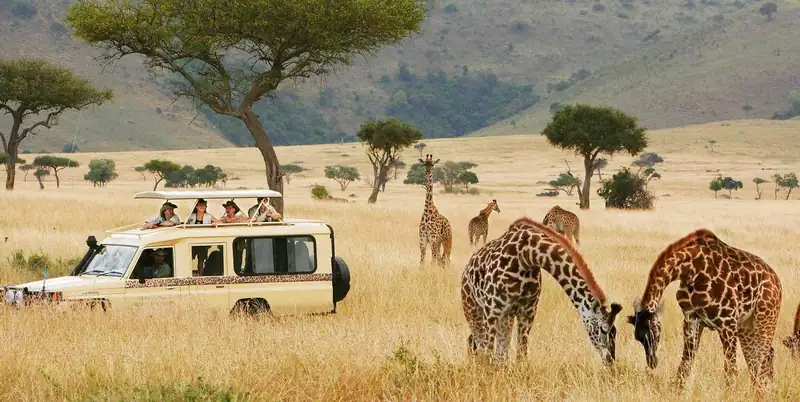
Finding a reliable tour operator is crucial for a memorable safari experience. Consider the following tips when choosing an operator:
- Research Tour Operators: Look for operators with strong reviews and ratings on platforms like TripAdvisor or SafariBookings. Check for consistently positive feedback and detailed experiences shared by previous travelers.
- Verify Credentials: Ensure the operator is registered with relevant tourism boards and associations, such as the African Travel and Tourism Association (ATTA). This ensures they adhere to industry standards and best practices.
- Evaluate Inclusivity: Look for operators offering all-inclusive packages that cover accommodation, meals, park fees, and transportation. This can help you avoid unexpected costs.
- Sustainability Focus: Choose operators committed to eco-friendly and sustainable tourism practices. This supports local communities and conserves the environment.
- Personalized Service: Opt for operators that offer personalized services, addressing your specific needs and preferences. They should be willing to customize itineraries to match your interests.
By carefully selecting a reputable group safari operator, you can ensure your adventure is both affordable and memorable.
Pack Smart and Travel Light
When planning an affordable African safari, packing strategically and traveling light is key. Here’s how to do it:
Essential Packing Tips for Budget Safaris
- Pack Light
- Focus on essential items to keep the load manageable. Overpacking can increase transportation costs and make your journey cumbersome. Use multi-functional items and travel-size toiletries.
- Choose Versatile Clothing
- Opt for versatile and durable clothing suitable for the climate. Neutral colors like khaki, beige, and green blend with the environment and don’t attract insects. For example, a lightweight, long-sleeve shirt can provide sun protection during the day and warmth in the evening.
- Layered Clothing
- Prepare for temperature fluctuations by bringing layered clothing. Early mornings and evenings can be chilly, while midday temperatures soar. A fleece jacket or vest is perfect for layering comfortably.
- Comfortable Footwear
- Pack sturdy, comfortable shoes or boots for walking and rough terrain. Well-worn hiking boots or trail shoes ensure you stay comfortable during long game drives and walking safaris.
- Quality Binoculars
- Seeing wildlife up close is a primary safari goal. Invest in quality binoculars to enhance your experience without venturing too close.
- Camera with Zoom Lens
- Capture memories with a camera equipped with a zoom lens. This allows you to take stunning wildlife photos without disturbing the animals.
- Wide-Brimmed Hat
- Protect yourself from the harsh African sun with a wide-brimmed hat. Choose one with a chin strap to keep it secure during windy conditions.
- Insect Repellent and Sunscreen
- Essential for safeguarding against bugs and sunburn. Opt for a high SPF sunscreen and an eco-friendly repellent.
- Reusable Water Bottle
- Stay hydrated by carrying a durable, reusable water bottle. Many camps and lodges offer refills, reducing plastic waste.
Prioritize Activities and Experiences
Planning an African safari on a budget doesn’t mean you have to sacrifice memorable experiences. Here are essential activities and tips to make the most out of your adventure.
Must-Do Safari Activities on a Budget
- Self-Drive Safaris
Self-drive safaris are one of the most economical ways to explore the African wilderness. In Kruger National Park, South Africa, you can drive your own car and significantly cut costs. Vehicle rentals in countries like South Africa and Namibia are straightforward, with well-maintained road networks making self-drive holidays a hassle-free option. - Full-Day or Half-Day Game Drives
Booking full-day or half-day game drives offers an affordable way to experience guided tours through game reserves. These drives typically last 3-4 hours and might include lunch or dinner. Prices range from $100 to $158 per person, varying based on whether you drive yourself or opt for transfers. This is a fantastic way to see wildlife without very costly.
- Travel During Peak Wildlife Seasons
To get the most out of your safari, plan your trip during peak wildlife viewing seasons. For example, the dry season, from June to October, is ideal in many regions, as animals gather around water sources, making them easier to spot. - Use Binoculars and Cameras with Zoom Lenses
Enhance your wildlife viewing experience with good binoculars and a camera with a zoom lens. This equipment allows you to observe animals closely without disturbing them, giving you a more intimate look at Africa’s magnificent creatures. - Visit Waterholes and Rivers
Spend time at key locations like waterholes and rivers, especially early in the morning or late in the afternoon, when animals are most active. These spots are hotspots for wildlife activity, increasing your chances of incredible sightings. - Hire Local Guides
Consider hiring local guides who know the terrain and habits of the animals. Their expertise can vastly improve your safari experience, ensuring you see as much wildlife as possible. Also, local guides often know the best times and places to find specific animals.
By prioritizing these activities and experiences, you can have an unforgettable safari adventure without overspending.
Utilize Travel Resources and Insurance
When planning your affordable African safari, leveraging travel resources and securing the right insurance are crucial. These steps ensure you’re well-prepared for your adventure without very costly.
Importance of Travel Insurance
Travel insurance is crucial when planning an African safari because it covers significant financial investments and unforeseen events.
- Coverage for Unexpected Events: Insurance can cover trip cancellations, interruptions, and delays, which are common in safaris with multiple internal flights and complex itineraries.
- Medical Emergencies: Given the remote locations of many safari destinations, having insurance that covers medical emergencies is essential. This ensures you receive necessary medical care without incurring exorbitant costs.
Useful Resources for Safari Planning
Using reliable resources can make planning your safari smoother and more cost-effective.
- Local Safari Operators: Booking with local African companies can significantly reduce costs. Local operators often offer better rates and personalized service, ensuring you get the most out of your safari.
- Online Booking Platforms: Websites like SafariBookings and TripAdvisor offer extensive reviews and competitive rates on tours and accommodations, helping you make informed choices.
- Travel Forums and Blogs: Platforms like Lonely Planet’s Thorn Tree forum or travel blogs can provide firsthand insights and tips from other travelers who have experienced African safaris.
- Government Tourism Websites: Visit official tourism websites for up-to-date information on visa requirements, safety advisories, and environmental considerations.
By utilizing these resources and securing comprehensive travel insurance, you can plan an unforgettable and affordable African safari adventure with confidence.
Conclusion
Affordable African safari planning is entirely achievable with the right strategies. By choosing budget-friendly destinations like South Africa Namibia and Zimbabwe you can experience unforgettable wildlife adventures without very costly. Opt for self-drive holidays camping or local lodges to cut costs further.
Timing your trip during the off-season and joining group tours can also save you money while enhancing your experience. Don’t forget to pack smart prioritize essential activities and leverage travel resources. With these tips in mind you’re well on your way to an affordable and memorable African safari adventure.
Frequently Asked Questions
How can I plan an African safari on a budget?
Planning a budget-friendly African safari involves several strategies. Choose affordable destinations like South Africa or Namibia, travel during the off-season, book in advance, and use local tour operators. Opt for cost-effective accommodations like camping or self-catering lodges. Consider self-drive safaris or joining group tours to cut costs further.
Is Kenya or Tanzania cheaper for a safari?
Kenya is generally more affordable than Tanzania for safari experiences. Whether you are looking for budget-friendly camping trips or luxury lodges, Kenya tends to offer more competitive prices compared to Tanzania.
Can you wear shorts on a safari in Africa?
Yes, wearing shorts is appropriate for safaris, especially during hot afternoons. Pack 3 pairs of shorts and comfortable, breathable pants in neutral colors. Avoid anything too tight and consider layering for fluctuating temperatures.
Which African country is safest for Americans?
Countries like Botswana, Kenya, Namibia, Tanzania, and Mauritius are considered safe for American travelers. Always research current travel advisories and take common safety precautions.
Which African country is the cheapest for a safari?
South Africa is often the most affordable African safari destination, offering a range of experiences. Other budget-friendly countries include Namibia, Zimbabwe, and Kenya.
What are some cost-saving strategies for an African safari?
Travel during the off-season, join group tours, use local operators, book in advance, and consider self-drive safaris. Additionally, leverage loyalty points or travel rewards, and opt for budget accommodations like tented camps or hostels.
What is the best time to travel for an affordable safari?
Traveling during the off-season can lower costs and reduce crowds. Consider the shoulder seasons for a balance of affordability and favorable conditions. The dry season generally offers better wildlife viewing, while the rainy season provides lush landscapes.
How important is travel insurance for an African safari?
Travel insurance is crucial for covering financial investments and unforeseen events such as trip cancellations or medical emergencies. It provides peace of mind, especially when traveling to remote locations.
Are self-drive safaris a good way to save money?
Yes, self-drive safaris can be a budget-friendly option. Places like South Africa and Namibia offer well-maintained roads and accessible game reserves. Renting a suitable vehicle and using self-catering accommodations can further reduce costs.
What are affordable accommodation options for a safari?
Budget-friendly accommodations include camping, self-catering lodges, and local tented camps. Prices can be as low as $17 per night in some locations. Full board options, which include meals, can also be economical and convenient.
